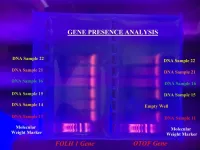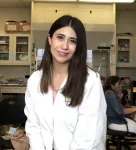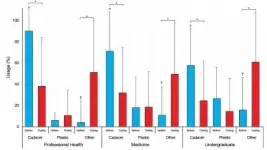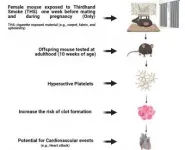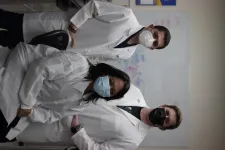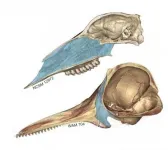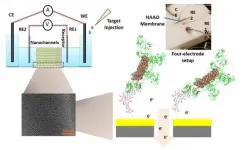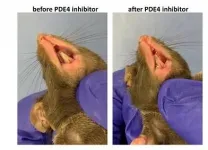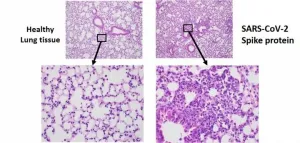(Press-News.org) Corals are part of a highly complex ecosystem, but it remains a mystery if and how they might communicate within their biological community. In a new study, researchers found evidence of sound-related genes in corals, suggesting that the marine invertebrates could use sound to interact with their surroundings.
Coral reefs make up less than 1% of the ocean floor yet support more than 25% of all marine life. Around the world, coral reefs are being threatened by climate change, ocean acidification, diseases, overfishing and pollution. A better understanding of coral communication could help inform policies that aim to protect this critical ecosystem.
"A growing number of studies have shown that trees can communicate, and that this communication is important for ecosystems such as rain forests," said Camila Rimoldi Ibanez, a high school student in the dual enrollment program at South Florida State College. "Coral reefs are often referred to as the rainforests of the sea because of the habitat they provide for a wide variety of plants and animals. Thus, we wanted to find out how coral communicates."
Ibanez will present the new findings at the END
Could corals use sound to communicate?
New evidence suggests corals may have genes involved in receiving or emitting sound
2021-04-27
ELSE PRESS RELEASES FROM THIS DATE:
Depression medication could also protect against heart disease
2021-04-27
The antidepression drug duloxetine could be beneficial to patients with both depression and cardiovascular disease, according to new studies performed in human blood and in mice. Globally, more than 300 million people have depression, which comes with an increased risk of developing cardiovascular disease.
When a blood vessel is injured, the platelets in our blood respond by forming clots that stop blood bleeding. If this activation goes into overdrive, it can lead to thrombosis, a condition where blood clots form inside blood vessels and can dislodge to lead to a heart attack or stroke. In the new studies, researchers showed that duloxetine inhibited platelet function and protected ...
Five new insights in the fight against COVID-19
2021-04-27
Scientists from around the world are gathering to share the latest research at the forefront of biology during the END ...
Five studies point to dangers of environmental exposures
2021-04-27
Recent years have brought increased attention to the lasting effects of chemicals we unwittingly inhale, touch and ingest while going about our daily lives. The END ...
Gene changes might explain long-haul COVID-19 symptoms
2021-04-27
Results from a new cell study suggest that the SARS-CoV-2 spike protein can bring about long-term gene expression changes. The findings could help explain why some COVID-19 patients -- referred to as COVID long-haulers -- experience symptoms such as shortness of breath and dizziness long after clearing the infection.
SARS-CoV-2, the virus that causes COVID-19, is covered in tiny spike proteins. During infection, the spike proteins bind with receptors on cells in our body, starting a process that allows the virus to release its genetic material into the inside of the healthy cell.
"We found that exposure to the SARS-CoV-2 spike protein alone was enough to change ...
How does a nose evolve into a blowhole? Study suggests there's more than one way
2021-04-27
The two major types of cetaceans appear to have evolved their characteristic blowholes through different anatomical transformations, according to a study being presented at the END ...
Plant compound shows promise against triple-negative breast cancer
2021-04-27
Findings from a new cell study suggest that the natural plant compound sanguinarine could be a promising tool for targeting triple-negative breast cancer cells. The researchers also found that breast cancer cells derived from people with African American ancestry were more sensitive to sanguinarine than those of European origin.
"Triple negative breast cancer is especially aggressive in African American women, who are also more likely to develop this type of breast cancer than women of European descent," said Samia Messeha, PhD, a research associate in the College of Pharmacy and Pharmaceutical Science at Florida Agricultural and Mechanical ...
Researchers design sensor for fast, inexpensive on-site Ebola detection
2021-04-27
Researchers are developing a new sensor that can detect Ebola in a single drop of blood and provides results in just an hour. With further development, the technology might also enable fast and inexpensive detection of other viruses, including the virus that causes COVID-19.
Ebola is one of the deadliest of all known viruses, killing up to 90% of those infected. Stopping its spread requires quickly detecting and isolating infected people. However, outbreaks tend to occur in remote areas of Africa, requiring blood tests to be transported to distant laboratories for analysis. This leads to significant delays in identifying a new outbreak.
Soma Banerjee, PhD, a visiting scientist in Marit Nilsen-Hamilton's laboratory at Iowa State ...
Researchers uncover potential new way to treat dry mouth
2021-04-27
Researchers studying mice made a serendipitous discovery that could lead to a new dry mouth treatment. More than 10% of people experience dry mouth, which can be caused by medical conditions, radiation treatment, certain medications and aging.
Abigail Boyd, a doctoral candidate at the University of South Alabama, and colleagues made the new discovery while exploring the anti-inflammatory benefits of inhibiting phosphodiesterase-4 (PDE4) enzymes in a mouse model of bacterial lung infection. After noticing that mice treated with a PDE4 inhibitor were salivating, they decided to examine whether this observation could be translated into a dry mouth therapy. They ...
SARS-CoV-2 spike protein alone may cause lung damage
2021-04-27
Using a newly developed mouse model of acute lung injury, researchers found that exposure to the SARS-CoV-2 spike protein alone was enough to induce COVID-19-like symptoms including severe inflammation of the lungs.
SARS-CoV-2, the virus that causes COVID-19, is covered in tiny spike proteins. These proteins bind with receptors on our cells, starting a process that allows the virus to release its genetic material into a healthy cell.
"Our findings show that the SARS-CoV2 spike protein causes lung injury even without the presence of intact virus," said Pavel Solopov, PhD, DVM, research assistant professor at the Frank Reidy Research Center for Bioelectrics at Old Dominion University. "This previously unknown mechanism could cause symptoms before substantial viral replication ...
'Smart shirt' takes a trip to space for science
2021-04-27
A technology-packed tank top offers a simple, effective way to track astronauts' vital signs and physiological changes during spaceflight, according to research being presented at the END ...
LAST 30 PRESS RELEASES:
Ketamine high NOT related to treatment success for people with alcohol problems, study finds
1 in 6 Medicare beneficiaries depend on telehealth for key medical care
Maps can encourage home radon testing in the right settings
Exploring the link between hearing loss and cognitive decline
Machine learning tool can predict serious transplant complications months earlier
Prevalence of over-the-counter and prescription medication use in the US
US child mental health care need, unmet needs, and difficulty accessing services
Incidental rotator cuff abnormalities on magnetic resonance imaging
Sensing local fibers in pancreatic tumors, cancer cells ‘choose’ to either grow or tolerate treatment
Barriers to mental health care leave many children behind, new data cautions
Cancer and inflammation: immunologic interplay, translational advances, and clinical strategies
Bioactive polyphenolic compounds and in vitro anti-degenerative property-based pharmacological propensities of some promising germplasms of Amaranthus hypochondriacus L.
AI-powered companionship: PolyU interfaculty scholar harnesses music and empathetic speech in robots to combat loneliness
Antarctica sits above Earth’s strongest “gravity hole.” Now we know how it got that way
Haircare products made with botanicals protects strands, adds shine
Enhanced pulmonary nodule detection and classification using artificial intelligence on LIDC-IDRI data
Using NBA, study finds that pay differences among top performers can erode cooperation
Korea University, Stanford University, and IESGA launch Water Sustainability Index to combat ESG greenwashing
Molecular glue discovery: large scale instead of lucky strike
Insulin resistance predictor highlights cancer connection
Explaining next-generation solar cells
Slippery ions create a smoother path to blue energy
Magnetic resonance imaging opens the door to better treatments for underdiagnosed atypical Parkinsonisms
National poll finds gaps in community preparedness for teen cardiac emergencies
One strategy to block both drug-resistant bacteria and influenza: new broad-spectrum infection prevention approach validated
Survey: 3 in 4 skip physical therapy homework, stunting progress
College students who spend hours on social media are more likely to be lonely – national US study
Evidence behind intermittent fasting for weight loss fails to match hype
How AI tools like DeepSeek are transforming emotional and mental health care of Chinese youth
Study finds link between sugary drinks and anxiety in young people
[Press-News.org] Could corals use sound to communicate?New evidence suggests corals may have genes involved in receiving or emitting sound
